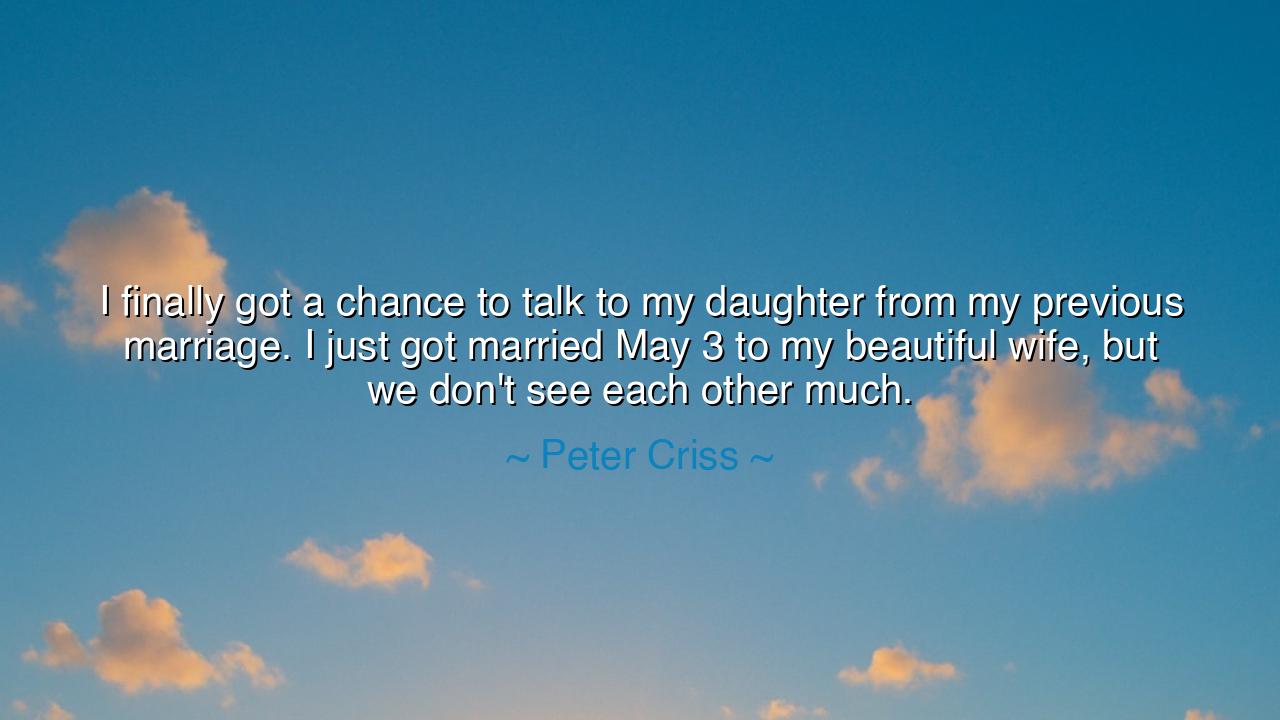
I finally got a chance to talk to my daughter from my previous
I finally got a chance to talk to my daughter from my previous marriage. I just got married May 3 to my beautiful wife, but we don't see each other much.






Hear, O Children of the Earth, for the words of Peter Criss carry the weight of a soul in search of connection, of understanding, and of love: "I finally got a chance to talk to my daughter from my previous marriage. I just got married May 3 to my beautiful wife, but we don't see each other much." These words, though simple, hold a depth that echoes through the corridors of time. They speak not only of the joys and challenges of family but also of the fragility of human connections, the delicate balance between love and responsibility, and the quest for harmony in a world often divided by distance and circumstance.
Family, the cornerstone of human society, is a complex and ever-evolving structure. From the dawn of time, men and women have sought to create bonds that transcend the self, to build families that provide support, love, and continuity. In the ancient world, marriage was often seen as a sacred contract, not just between two individuals but between families, tribes, and even nations. It was a union of futures, a merging of destinies. Yet, families are not without their trials. The path to unity is often fraught with challenges—whether of distance, misunderstanding, or the passing of time. Peter Criss' words reveal the unspoken truth that the bonds we hold dearest—those of parenthood and marriage—are often strained by the demands of the world.
Consider, O Children, the story of King Solomon, whose wisdom was unparalleled in the ancient world. Solomon, though surrounded by great wealth and power, faced deep personal struggles, particularly in the realm of his own family. His numerous marriages and the vast number of his children created a complex web of relationships that were difficult to navigate. In his wisdom, Solomon understood that true connection requires effort—that even a king, despite his riches, could not control the forces that divide. Distance, whether physical or emotional, is a force that can tear at the very fabric of even the most sacred bonds. Solomon’s understanding of the need for balance in relationships mirrors the struggle we all face: the desire to love deeply, but the reality that time and distance can often keep us from those we cherish most.
Peter Criss, in his reflection on his marriage to his wife and his relationship with his daughter, touches upon this same universal truth. Marriage is a beautiful bond, a sacred promise between two souls. But it is not without sacrifice. The demands of life, whether they come in the form of careers, personal ambitions, or obligations, can pull us away from those we love. The longing for connection is universal, but it is not always fulfilled in the way we desire. Criss' words remind us that even in the most intimate relationships, time and separation are forces that we cannot always control.
The words also speak to the importance of family as a source of fulfillment and grounding. Parenthood is one of the most profound experiences a human being can undergo. It binds us to the future, to the very continuation of our species. Yet, like all relationships, it requires effort and sacrifice. To truly connect with our children, we must give them our time, our attention, and our love. When distance comes between parent and child, whether through physical separation or emotional turmoil, it can leave a wound that only love can heal. Peter Criss, in his words, acknowledges the challenge of maintaining these bonds in a world that often pulls us in different directions.
Let us turn now to the story of Hannibal Barca, the great Carthaginian general, whose love for his family was both his driving force and his greatest burden. Hannibal’s devotion to his people and his family was evident in his struggles to protect Carthage. Yet, his family—his father, his brothers—were often separated from him by the demands of war. The distance between him and his loved ones was a constant source of emotional strain. Despite his victories, Hannibal's story reminds us that no man, no matter how great, can escape the heartache of separation from family. It is this tension—between duty and love—that Peter Criss speaks of in his reflection on his own life.
The lesson for you, O Children of the Future, is this: Cherish the bonds that tie you to your family, but understand that these bonds are not always easy to maintain. Love requires effort, and the distance that separates you from those you care about can be as much a part of life as the closeness you desire. It is a truth that all must face: the journey of parenthood and marriage is one of great beauty, but it also demands sacrifice.
Act, therefore, with awareness and intention. Make time for those you love, even when life pulls you in many directions. Do not allow the forces of distance—whether emotional or physical—to weaken the connections you hold dear. Remember that the bonds of family are worth the effort, and that love, when nurtured, can overcome even the greatest distances. Let your hearts be open, and your actions steady, so that you may walk the path of love with strength and understanding, always mindful of the delicate balance that binds us all.






AAdministratorAdministrator
Welcome, honored guests. Please leave a comment, we will respond soon